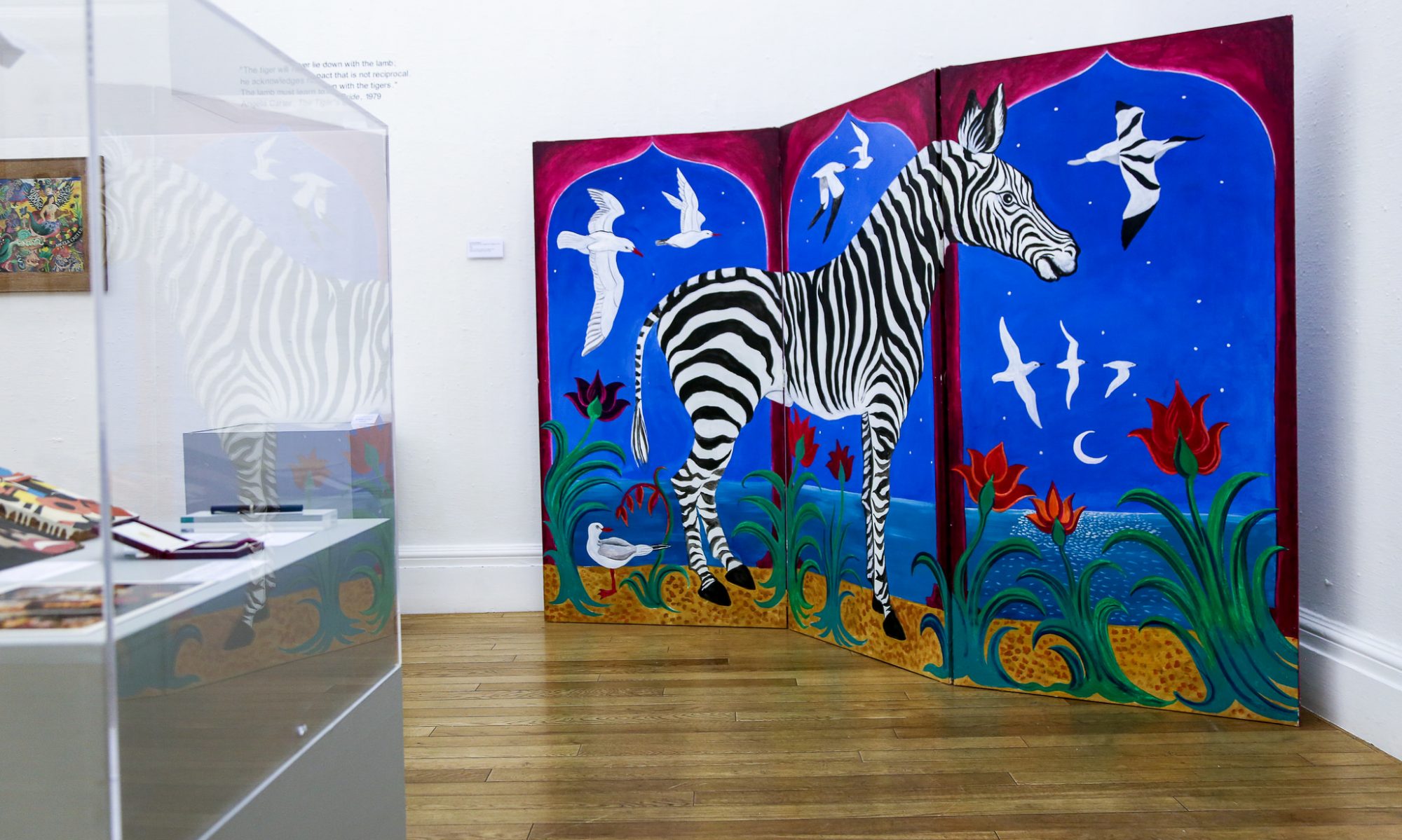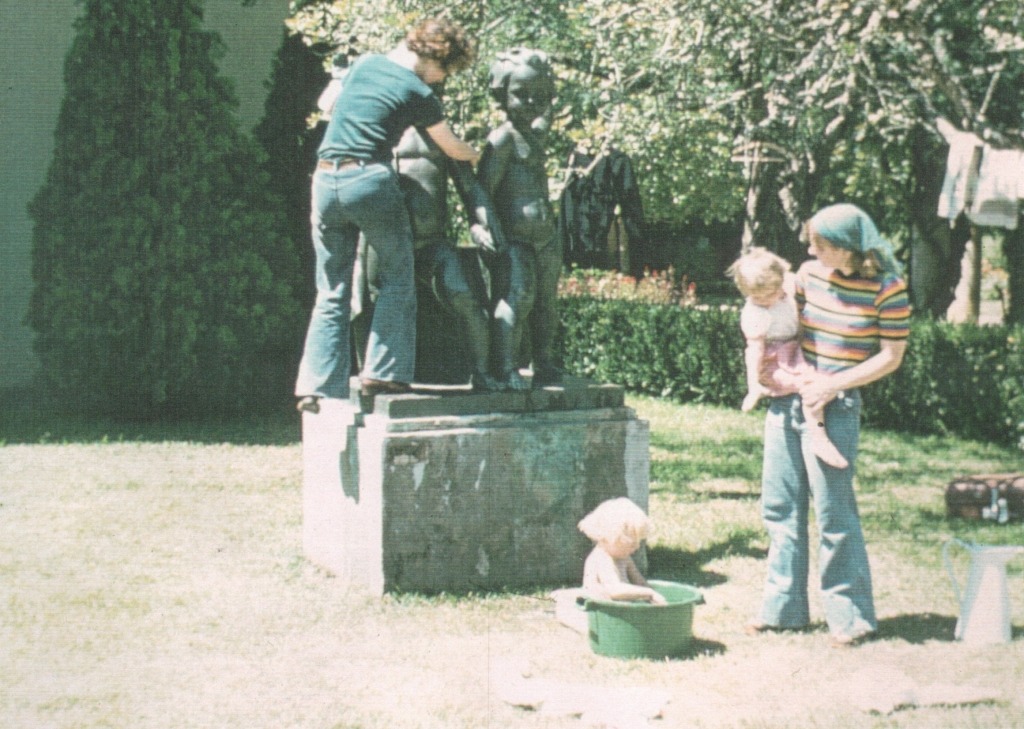Call for Papers
“Desire, Imagination and Dream” – Angela Carter in Portugal
University of Lisbon, Portugal
27-29 June 2024
This international conference under the aegis of the Angela Carter Society seeks to explore the complex and multi-layered relationships between art, politics, place, and sexuality in the writings of Angela Carter. Taking place at the University of Lisbon, the conference takes inspiration from Carter’s visit to Portugal in the summer of 1977, which she wrote about in two essays for New Society. In these pieces, Carter describes her experiences visiting the small town of Caldas da Rainha, in particular the local ceramics market and her attendance of the international Meeting of Art, which consisted of ‘twelve days of exhibitions, debates, films, performances and God knows what else besides’[1]. Carter was not alone on this trip, for she was accompanying artists Shirley Cameron and Roland Miller, as well as their two baby daughters Lois and Colette. Both of Carter’s pieces for New Society draw attention to the often-fraught relationship between art, politics, and place, not only through the highly political artworks on display at the festival, but also through Carter’s musings on the ceramics industry in Caldas da Rainha.
The 1970s were a highly productive decade for Carter, as she published novels, short stories, journalistic pieces, English translations of Charles Perrault’s fairy tales, and an extended essay on the Marquis de Sade. It was also important in terms of Carter’s personal development, for she left her then-husband Paul and moved to Japan, experimenting with new sexual relationships as well as learning to see herself as “other” in a foreign land. Her writings from this period, including her first collection of stories, Fireworks, evince a strong sense of place and of travelling beyond the familiar topographies of Europe. While in Japan, Carter wrote her most experimental novel, The Infernal Desire Machines of Doctor Hoffman, which features a political revolution fought through the medium of images that have obtained the same reality status as the things they depict. Just months before visiting Portugal in August of 1977, Carter had started her ‘Beauty and the Beast’ sequence of stories that would eventually be collected in The Bloody Chamber and Other Stories and which would bring to the fore the buried latent content of fairy tales; at around the same time, The Passion of New Eve was also first published, a novel which explores the idea of identity as a performance mediated by cinematic images and in a country torn apart by civil war, often narrated in a tone of black humour. In these and many other works from this period, Carter explores the overlapping of subjectivity, artistic creation, political ideologies, and place.
The 1970s were also an important decade for Portugal, with democracy being restored a mere three years before Carter arrived. As Edmund Gordon writes in his biography of Carter, Portugal was “still very young and vulnerable, and many of the inhabitants of Caldas da Rainha lived in dire poverty”.[2] Indeed, in her two New Society essays, Carter paints a vivid picture of the town, with its poor labourers, illiterate “gypsies”[3], and graffitied political slogans (such as “LONG LIVE STALIN”[4]); at one point, she recalls meeting a “deaf-and-dumb lottery salesman” who showed her “a photograph of a friend of his who had been shot under Salazar in the square right outside the café, just in front of the building that is now the Maoist headquarters”.[5] Carter also observes that the ceramics market of Caldas da Rainha is under threat from the production of cheap plastic and enamel products, wryly noting that the beautiful but more expensive ceramic versions “will find a more welcome home in the stripped pine kitchens of developed countries”.[6]
The most dramatic part of her stay in Portugal is the moment when a group of “right-wing thugs arrived at the fish market to smash up the decadent sculptures, cheered on by the locals”, as Gordon puts it.[7] He also observes that a small town full of poverty was perhaps “not the most favourable setting” [8] for a series of avant-garde artworks and jokes, including one group of artists “rumoured to want to stage a séance d’amour in the park”.[9] Carter was also unsurprised by the reaction from some of the locals: “Maybe not even the organisers of the festival had quite got the measure of the town, with its Maoists and Stalinists and communists and anarchists, its unusually high number of refugees from Angola, its respectable poverty, its sordid poverty and its Chekhovian middle class”.[10] After fleeing to the safety of a hostel, Carter started “making up aphorisms, to try to explain things to [herself]”, including: “In a country where bread is scarce, one should feed the birds with discretion”. This aphorism, in particular, “seems to sum up the twelve days of art activity in Caldas da Rainha and how it went wrong”, Carter writes, because “desire, imagination and dream – the domains of art – these, too should be distributed with care in a country where the very possibility of such things might seem to mock the reality of the inhabitants.”[11]
Carter’s characteristic humour also appears in her Portuguese essays, in particular through her descriptions of the ceramic markets. In a line that recalls the illusionistic revolution of Doctor Hoffman, Carter writes that the “ceramic feast” at the market features “red apples [which] are far too beautiful to eat […] If you could eat with your eyes, you wouldn’t need agrarian reform”.[12] She also notes the functionalist aesthetic of many pieces, such as the “brace of walnuts” transformed into “salt-shakers” – “Stalin would have loved” the “intense realism” of this aesthetic, she jokes.[13] In a section reminiscent of her earlier writings about Japanese fertility festivals, Carter devotes a long section to the various sexual ceramic pieces on offer, including figurines whose real clothes “may all be lifted to reveal, beneath, [their] dangling prick[s]”, “little baskets full of teeny tiny pricks for sale, made into lapel badges to wear”, and a ceramic couple that can be made to simulate copulation through a simple mechanism.[14] The latter leads Carter to argue that “Iberian puritanism” clearly holds Caldas da Rainha “securely in its grip”, as the ceramic couple “describe[s] sexual intercourse as a brief, mechanical operation accompanied by an audible click of unaccustomed musculature”.[15] She also contrasts the market ceramics from those on display at the local museum in a retrospective exhibition, which she suggests should be entitled “200 years of the god-awful” with its giant ceramic cabbage leaf, a vase shaped like an arum lily, and the “beautifully executed caricature figures of old peasants […] their wrinkled faces twisted in the sickly grin of the Uncle Tom”.[16] Carter concludes by suggesting that the only difference between the museum pieces and the market pieces is an academic difference between “high vulgarity and low vulgarity”, before then noting that the labourers here “can’t do anything else” but produce this “degenerate art”, much like the copulating couple figures who can only perform one functionalist action.[17]
This conference presents us all with an opportunity to reflect on the intersections of art, sexuality, politics and place in the writings of Angela Carter, from her many novels and short stories to her voluminous collection of journalistic writings. 2024 is also an important year for Portugal, as it marks the 50th anniversary of the Carnation Revolution which re-established democracy in the country. We therefore invite speakers to connect Carter’s writings about politics and place with the recent history of Portugal, and to the acts of remembering and receiving.
The conference will also feature a special Angela Carter-inspired meal on the Friday night as well as a day trip to Caldas da Rainha on Saturday.
Contributions could address, but are not limited to, one or several of the following areas:
- Carter’s writings on politics
- Carter’s meditations on art and aesthetics
- Explorations of gender and sexuality in Carter’s writings
- Place and literature
- Receiving and remembering the past
- Carter’s interest in arts and crafts
- The distinction between high and low art
- Surrealism
- Carter’s writings on food and food culture
- The relationships between art, politics, place, and sexuality in Carter’s oeuvre
Keynote Speakers
Dr Yutaka Okuhata (Japan Women’s University, Tokyo), author of Angela Carter’s Critique of Her Contemporary World: Politics, History, and Mortality
Camilla Grudova, author of The Doll’s Alphabet (Fitzcarraldo Editions, 2017), Children of Paradise (Atlantic Books, 2022), The Coiled Serpent (Atlantic Books, 2023)
Submissions
Please note that to present at this conference you need to be a member of the Angela Carter Society – you can join here.
Proposals of 300 words should be sent to Maria Pires (maria.pires@eshte.pt) or Caleb Ferrari (caleb.ferrari@uwe.ac.uk). Deadline: 31 January 2024.
The Angela Carter Society Essay Awards will be announced at the conference. Please read more about how to submit here. Deadline: 31 January 2024.
Notes
[1] Angela Carter, ‘Bread on Still Waters’, in Shaking a Leg: Collected Journalism and Writings, ed. Jenny Uglow (London: Vintage, 2013), p. 269.Notes
[2] Edmund Gordon, The Invention of Angela Carter: A Biography (London: Chatto & Windus, 2016), p. 280.
[3] Carter, ‘Bread’, p. 269.
[4] Ibid., p. 270.
[5] Ibid., p. 270.
[6] Angela Carter, ‘A Petrified Harvest’, in Shaking a Leg: Collected Journalism and Writings, ed. Jenny Uglow (London: Vintage, 2013), p. 264.
[7] Gordon, Invention, p. 280.
[8] Ibid., p. 280.
[9] Carter, ‘Bread’, p. 270.
[10] Ibid., pp. 271-72.
[11] Ibid., p. 272.
[12] Carter, ‘Petrified’, p. 265.
[13] Ibid., p. 265.
[14] Ibid., p. 266.
[15] Ibid., p. 267.
[16] Ibid., pp. 267-68.
[17] Ibid., p. 268.
Image: Photo of Angela Carter and Shirley Cameron, Portugal 1977. Photo by Roland Miller; used with kind permission by Shirley Cameron.

